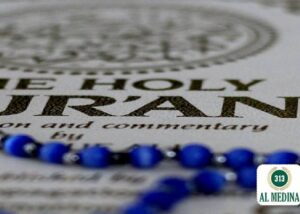Quran
Hadith
Islamic Text
The Hadith stating ‘fasting is a shield’, refers to the fact that whilst a person is fasting it is easier to turn away from sin and inappropriate matters.
عَنْ أَبِي هُرَيْرَةَ رَضِيَ اللَّهُ عَنْهُ، أَنَّ رَسُولَ اللَّهِ صَلَّى اللهُ عَلَيْهِ وَسَلَّمَ، قَالَ: الصِّيَامُ جُنَّةٌ فَلاَ يَرْفُثْ وَلاَ يَجْهَلْ، وَإِنِ امْرُؤٌ قَاتَلَهُ أَوْ شَاتَمَهُ فَلْيَقُلْ: إِنِّي صَائِمٌ مَرَّتَيْنِ
(Sayidina) Abu Hurairah (May Allah be pleased with him) narrated that Allah’s Messenger ﷺ said, ‘Fasting is a shield. So, the person observing fasting should avoid marital relations and should not behave ignorantly. If somebody fights with him or insults him, he should say, I am fasting, twice.’ (Sahih al-Bukhari, 1894).
The Hadith above is authentic without doubt, since it is a Musnad Hadith from Sahih al-Bukhari, and all such Hadith from Bukhari and Muslim are authentic (see link below for details). However, what is meant by fasting is a shield? It is obviously not literal, as we do not find that a person who fasts is presented with a physical shield. Rather it is referring to something related to the person’s spiritual state.
أي ستر ومانع من الرفث والآثام، أو مانع من النار وساتر منها، أو مانع من جميع ذلك. (إِكمَالُ المُعْلِمِ بفَوَائِدِ مُسْلِم)
Meaning it is a veil and barrier (protecting one) from profanity and sin, or a barrier from the fire (hell) and a veil (protecting one from the fire), or it may encompass all of that. (Imam Qadi Iyaad, Sharh Muslim).
As mentioned by Imam Qadi Iyad, there are a number of possibilities regarding the interpretation of the Hadith. It could be referring to the fact that fasting protects a person from sin, or the fact that it protects one from the fire. These possibilities are not contradictory, rather complimentary. Therefore, Imam Qadi Iyad suggested that the Hadith could encompass both.
And Allah Most High Knows Best.
-Answered by Shaykh Noorud-deen Rashid (07.04.2022)
See also:
Are all Hadith in Bukhari and Muslim Sahih?
See also video:






